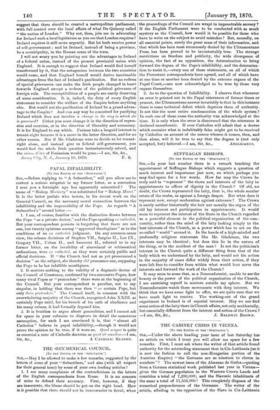THE (ECUMENICAL COUNCIL.
[To THE EDITOR OF THE "SPECTATOR.”] SIR,—May I be allowed to make a few remarks, suggested by the letters of some of your "Subscribers," and also (with all respect for their general tone) by some of your own leading articles ?
1. I see many complaints of the contradictions in the letters of the English correspondents from Rome. It is no concern of mine to defend their accuracy. First, however, if they are inaccurate, the blame should be put on the right head. How is it possible that there should not be inaccuracies in detail, when the proceedings of the Council are wrapt in impenetrable secrecy? If the English Parliament were to be conducted with as much mystery as the Council, how would it be possible for those who have to write on the subject to avoid mistakes ? But, secondly, on all essential points, surely the great mass of their information, and that which has been most strenuously denied by the Ultramontane Press, has been proved to be incontestably true. The strange restrictions on freedom and publicity, the wide divergence of opinion, the fact of an opposition, the determination to bring forward the dogma of the Pope's infallibility, and the determina- tion to resist it,—every one of these statements, on all of which the Protestant correspondents have agreed, and all of which have at one time or another been denied by the extreme organs of the Papal Court,—are now acknowledged to be true by those very organs themselves.
2. As to the question of Infallibility. I observe that whenever an error is pointed out in the Papal utterances of former times or present, the Ultramontane answer invariably is that in this instance there is some technical defect which deprives them of authority. Is not this the most entire condemnation of the whole system ? In each one of these cases the authority was acknowledged at the time. It is only when the error is discovered that the utterance is declared unauthentic. If ever Catholics will admit that a decree which contains what is indubitably false might get to be received by Catholics on account of the source whence it comes, then, and then alone, will it be true to say that the dogma is (not only
accepted, but) believed.—I am, Sir, &c., ANGLICANUS.


































 Previous page
Previous page